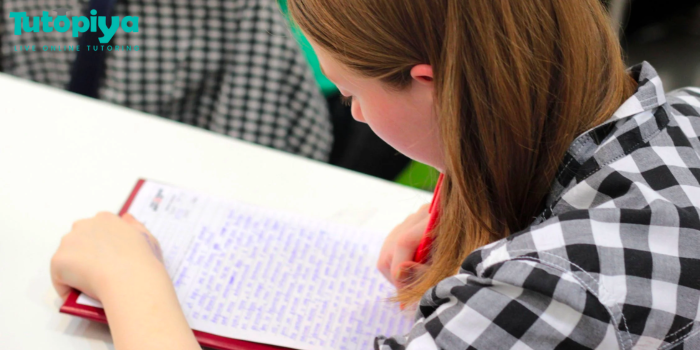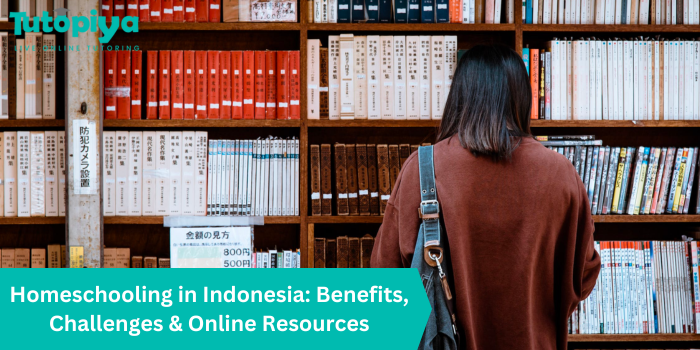Unlocking the Potential: Homeschooling in Indonesia – Benefits, Challenges, Reason to Choose and Online Resources
In the contemporary educational landscape, online homeschooling emerges as a potent tool, offering unparalleled flexibility and customization for students committed to academic excellence.
For private candidates in Indonesia seeking to independently pursue the IGCSE curriculum, Tutopiya’s Online Homeschooling program provides a holistic platform.
This program delivers tailored academic support, mentoring, and a comprehensive approach to exam preparation and registration guidance, ensuring a well-rounded educational experience.
Must Read: The Guide to Prepare Your Child for Home-Based Learning
Benefits of Homeschooling in Indonesia

Homeschooling is gaining traction as a compelling alternative to traditional schooling in Indonesia, providing numerous advantages for students and families. Here are some key benefits of homeschooling tailored to the Indonesian context:
Personalized Education: Homeschooling facilitates a customized learning experience that caters to each child’s unique needs, interests, and learning style. Parents or educators in Indonesia can adapt the curriculum, pace of instruction, and teaching methods to ensure a comprehensive and engaging education for individual students.
Must Read: Homeschooling in India: Benefits, Challenges and Online learning Platform
Flexible Scheduling: Homeschooling offers flexibility in scheduling, allowing students in Indonesia to learn at their own pace and adapt studies to extracurricular activities, travel plans, or family commitments. This flexibility eliminates the stress of adhering to a rigid school timetable, enabling students to maximize their learning opportunities.
Comfortable Learning Environment: In Indonesia, homeschooling takes place in the familiar and comfortable setting of the home, fostering a positive learning atmosphere that promotes engagement, focus, and a sense of belonging. This environment is conducive to effective learning, free from distractions.
Must Read: 27 Simple Tips To Boost Your Child’s Confidence
Reduced Social Pressures: Homeschooling helps alleviate social pressures that students may face in traditional school settings, such as bullying, peer pressure, and the fear of judgment. This allows children in Indonesia to develop self-confidence and social skills in a more nurturing and supportive setting.
Accommodations for Special Needs: Homeschooling can provide a more accommodating environment for students with special needs or learning disabilities in Indonesia. Parents or educators can tailor the curriculum and teaching methods to address specific needs, ensuring that students receive the necessary support to succeed academically.
Must Read: Tutopiya’s Guide On How to Increase Productivity in Students
Stronger Parent-Child Relationships: Homeschooling in Indonesia strengthens the bond between parents and children, as parents actively participate in their children’s education. This shared learning experience promotes open communication, mutual respect, and a deeper understanding of each other’s needs and aspirations.
Exposure to Diverse Learning Experiences: Homeschooling in Indonesia opens up opportunities for students to engage in a wide range of learning experiences beyond traditional academics. Exploring interests in areas such as art, music, sports, nature, and entrepreneurship fosters creativity, problem-solving skills, and a lifelong love of learning.
Must Read: English Tuition: Best Online English Tutors in Singapore
College Admissions Success: Homeschoolers in Indonesia have demonstrated strong academic performance, preparing them well for college admissions. Many homeschool graduates have gained admission to prestigious universities, showcasing outstanding academic success.
Cost-Effective Education: Homeschooling in Indonesia is a cost-effective alternative to traditional schooling, eliminating expenses like tuition, transportation, uniforms, and extracurricular activities. Parents can allocate resources toward customized curriculum materials, educational experiences, and enrichment opportunities.
Must Read: Time Management In IGCSEs: How To Make The Most Of Dead Time
Character Development and Life Skills: Homeschooling in Indonesia provides a nurturing environment for character development, instilling values such as responsibility, self-discipline, integrity, and empathy. Students also gain valuable life skills in areas such as communication, critical thinking, problem-solving, and time management.
Challenges of Homeschooling in Indonesia

While homeschooling offers various benefits, it is not without its challenges. Parents and homeschoolers in Indonesia may face specific difficulties, including:
Lack of Government Recognition and Support: Similar to challenges in other regions, homeschooling in Indonesia lacks formal recognition by the government. This may deprive homeschoolers of access to government funding or resources, potentially impacting their ability to afford necessary materials and support.
Must Read: IGCSE Homeschooling Guide
Social Isolation: Homeschoolers in Indonesia may experience feelings of isolation from their peers, as they don’t have the same opportunities to socialize with other children. This potential social disconnect can lead to social anxiety and other related problems.
Must Read: What Is Homeschooling: All you need to know as Parents and Students
Curriculum Challenges: Homeschoolers in Indonesia may face challenges related to curriculum options, teacher training, and legal uncertainties. The limited availability of curricula and the need for parents to piece together their own materials can be time-consuming and challenging.
Lack of Teacher Training: A prevalent challenge for homeschooling in Indonesia is the fact that most parents taking on the role of educators are not trained teachers. This lack of professional training may result in gaps in learning and other educational challenges for students.
Legal Uncertainties: Legal uncertainties surround homeschooling in Indonesia, posing challenges for parents in understanding the legality of homeschooling and accessing related services and opportunities. The evolving legal landscape may create confusion for homeschooling families.
Reasons for Choosing Homeschooling in Indonesia

Homeschooling can be a viable option for families in Indonesia for various reasons, in alignment with Google guidelines. Keep in mind that these reasons might vary based on individual circumstances and preferences. Here are some potential reasons to choose homeschooling in Indonesia:
Flexibility in Curriculum: Homeschooling allows parents to tailor the curriculum to meet the specific needs and interests of their children. This flexibility can be valuable in adapting education to the cultural context of Indonesia.
Cultural Relevance: Homeschooling provides an opportunity to incorporate local culture and values directly into the educational experience. This may involve incorporating Indonesian history, literature, and traditions into the curriculum.
Customized Learning Pace: In a homeschooling environment, children can progress at their own pace. This can be particularly beneficial for students who may need additional time to master certain concepts or want to move ahead more quickly in specific subjects.
Individualized Attention: Homeschooling allows for more one-on-one interaction between parents and children, providing a personalized and focused learning experience. This can be crucial for addressing individual learning styles and preferences.
Must Read: Homeschooling in Singapore: Benefits, Challenges, Online Resources
Flexible Schedule: Families can design a flexible schedule that accommodates travel, religious observances, or other cultural events specific to Indonesia. This flexibility can enhance the overall educational experience.
Emphasis on Character Development: Homeschooling provides an environment where character development and moral education can be integrated into the curriculum. Parents can impart cultural values and ethical principles alongside academic subjects.
Safety and Well-being: Concerns about the safety and well-being of students in traditional school settings may drive some parents to opt for homeschooling. This can be especially relevant in areas where there are safety concerns or where parents want to create a more controlled and secure learning environment.
Access to Diverse Learning Resources: Homeschooling allows for a wide range of learning resources beyond traditional textbooks. Online courses, cultural excursions, and community resources can be utilized to enrich the educational experience.
Specialized Education: Homeschooling can cater to the unique learning needs of children with special requirements, providing a more individualized and supportive learning environment.
Parental Involvement: Homeschooling encourages active parental involvement in a child’s education. This hands-on approach can foster strong family bonds and ensure that parents are aware of their child’s progress and challenges.
When considering homeschooling, it’s essential for parents to research the legal requirements and regulations related to homeschooling in Indonesia, ensuring compliance with local education laws. Additionally, consulting with education professionals and joining homeschooling communities can provide valuable support and resources.
Future of Homeschooling in Indonesia
Looking ahead, the future of homeschooling in Indonesia holds promise. As technological advancements continue to shape the educational landscape, online resources and platforms are likely to play a pivotal role in enhancing the homeschooling experience. The ability to access a wide range of educational materials, connect with experienced tutors, and participate in interactive virtual classrooms opens new avenues for personalized and effective learning.
Conclusion
Embracing homeschooling in Indonesia offers a unique opportunity for families to tailor their children’s education to individual needs and aspirations. While challenges exist, the benefits of a personalized, flexible, and nurturing learning environment contribute to the overall success and well-rounded development of homeschooled students in Indonesia. Tutopiya’s commitment to providing comprehensive support through Online Homeschooling ensures that private candidates receive the necessary guidance and resources to thrive in their educational pursuits and beyond.
Homeschooling in Indonesia: FAQs
Q. Is homeschooling legal in Indonesia?
A. Yes, homeschooling is legal in Indonesia. The government recognizes the right of parents to choose this alternative form of education for their children.
Q. What are the requirements for homeschooling in Indonesia?
A. The specific requirements may vary by region, but generally, parents need to register with the local education authorities and follow a curriculum approved by the government.
Q. Are there any support groups or networks for homeschooling families in Indonesia?
A. Yes, there are several homeschooling support groups and communities in Indonesia. These groups provide resources, information, and a platform for parents to connect and share experiences.
Q. How are homeschoolers assessed in Indonesia?
A. Assessment methods may include periodic testing, evaluations, and portfolios of the child’s work. Some parents may also choose to have their children take standardized tests to ensure they are meeting academic standards.
